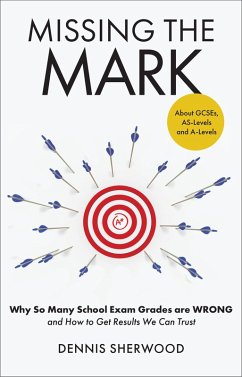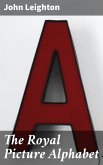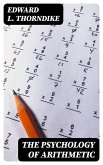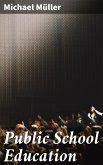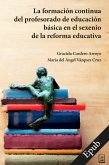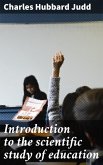Dennis Sherwood
Missing the Mark (eBook, ePUB)
Why So Many School Exam Grades are Wrong - and How to Get Results We Can Trust
10,79 €
10,79 €
inkl. MwSt.
Sofort per Download lieferbar

0 °P sammeln
10,79 €
Als Download kaufen

10,79 €
inkl. MwSt.
Sofort per Download lieferbar

0 °P sammeln
Jetzt verschenken
Alle Infos zum eBook verschenken
10,79 €
inkl. MwSt.
Sofort per Download lieferbar
Alle Infos zum eBook verschenken

0 °P sammeln
Dennis Sherwood
Missing the Mark (eBook, ePUB)
Why So Many School Exam Grades are Wrong - and How to Get Results We Can Trust
- Format: ePub
- Merkliste
- Auf die Merkliste
- Bewerten Bewerten
- Teilen
- Produkt teilen
- Produkterinnerung
- Produkterinnerung

Bitte loggen Sie sich zunächst in Ihr Kundenkonto ein oder registrieren Sie sich bei
bücher.de, um das eBook-Abo tolino select nutzen zu können.
Hier können Sie sich einloggen
Hier können Sie sich einloggen
Sie sind bereits eingeloggt. Klicken Sie auf 2. tolino select Abo, um fortzufahren.

Bitte loggen Sie sich zunächst in Ihr Kundenkonto ein oder registrieren Sie sich bei bücher.de, um das eBook-Abo tolino select nutzen zu können.
Reveals 1 in 4 school exam grades in England is wrong | Affects ONE MILLION GSCE, AS-Level and A-Level students every year | Relevant to English students, parents, teachers, universities and employers | Easy to follow text with 50 graphs and 15 tables | Recommends new ways to improve exam reliability | Solutions work for essay-based exams across the world
- Geräte: eReader
- ohne Kopierschutz
- eBook Hilfe
- Größe: 3.15MB
Andere Kunden interessierten sich auch für
![The Royal Picture Alphabet (eBook, ePUB) The Royal Picture Alphabet (eBook, ePUB)]() John LeightonThe Royal Picture Alphabet (eBook, ePUB)1,99 €
John LeightonThe Royal Picture Alphabet (eBook, ePUB)1,99 €![The Psychology of Arithmetic (eBook, ePUB) The Psychology of Arithmetic (eBook, ePUB)]() Edward L. ThorndikeThe Psychology of Arithmetic (eBook, ePUB)1,99 €
Edward L. ThorndikeThe Psychology of Arithmetic (eBook, ePUB)1,99 €![The Mind and Its Education (eBook, ePUB) The Mind and Its Education (eBook, ePUB)]() George Herbert BettsThe Mind and Its Education (eBook, ePUB)1,99 €
George Herbert BettsThe Mind and Its Education (eBook, ePUB)1,99 €![Public School Education (eBook, ePUB) Public School Education (eBook, ePUB)]() Michael MüllerPublic School Education (eBook, ePUB)2,49 €
Michael MüllerPublic School Education (eBook, ePUB)2,49 €![La formación continua del profesorado de educación básica en el sexenio de la reforma educativa (eBook, ePUB) La formación continua del profesorado de educación básica en el sexenio de la reforma educativa (eBook, ePUB)]() Graciela Cordero ArroyoLa formación continua del profesorado de educación básica en el sexenio de la reforma educativa (eBook, ePUB)9,99 €
Graciela Cordero ArroyoLa formación continua del profesorado de educación básica en el sexenio de la reforma educativa (eBook, ePUB)9,99 €![Introduction to the scientific study of education (eBook, ePUB) Introduction to the scientific study of education (eBook, ePUB)]() Charles Hubbard JuddIntroduction to the scientific study of education (eBook, ePUB)1,99 €
Charles Hubbard JuddIntroduction to the scientific study of education (eBook, ePUB)1,99 €![The Attitudes of Animals in Motion, Illustrated with the Zoopraxiscope (eBook, ePUB) The Attitudes of Animals in Motion, Illustrated with the Zoopraxiscope (eBook, ePUB)]() Eadweard MuybridgeThe Attitudes of Animals in Motion, Illustrated with the Zoopraxiscope (eBook, ePUB)2,49 €
Eadweard MuybridgeThe Attitudes of Animals in Motion, Illustrated with the Zoopraxiscope (eBook, ePUB)2,49 €-
-
-
- Reveals 1 in 4 school exam grades in England is wrong
- Affects ONE MILLION GSCE, AS-Level and A-Level students every year
- Relevant to English students, parents, teachers, universities and employers
- Easy to follow text with 50 graphs and 15 tables
- Recommends new ways to improve exam reliability
- Solutions work for essay-based exams across the world
Dieser Download kann aus rechtlichen Gründen nur mit Rechnungsadresse in A, B, BG, CY, CZ, D, DK, EW, E, FIN, F, GR, H, IRL, I, LT, L, LR, M, NL, PL, P, R, S, SLO, SK ausgeliefert werden.
Produktdetails
- Produktdetails
- Verlag: Canbury
- Seitenzahl: 414
- Erscheinungstermin: 7. Juni 2024
- Englisch
- ISBN-13: 9781914487002
- Artikelnr.: 64743306
- Verlag: Canbury
- Seitenzahl: 414
- Erscheinungstermin: 7. Juni 2024
- Englisch
- ISBN-13: 9781914487002
- Artikelnr.: 64743306
- Herstellerkennzeichnung Die Herstellerinformationen sind derzeit nicht verfügbar.
Dennis Sherwood is a management consultant with experience of solving complex problems. He has a Physics Masters from the University of Cambridge, an MPhil in Molecular Biophysics and Biochemistry from Yale University and a PhD in biology from the University of California in San Diego. After being a consulting partner at Deloitte Haskins + Sells, and Coopers & Lybrand, he became an executive director at Goldman Sachs. He now runs his own business, The Silver Bullet Machine Manufacturing Company Limited, specialising in organisational creativity and innovation. He is author of 14 books. Dr Robin Bevan is Headteacher of Southend High School for Boys. He was National President of the National Education Union in 2020-21.
DEDICATION. To the unknown, but very large, number of young people who have
been damaged by the award of wrong exam grades, in the hope that this will
not happen in the future
STATISTICS. Over the decade from 2010 to 2019, a total of about 70 million
GCSE, AS and A-level grades were awarded following each year’s summer exams
in England. • Of which around 17.5 million were wrong. • Yes,17.5 million.
• That’s about 1 wrong grade in every 4.
FOREWORD. Foreword by Dr Robin Bevan Headteacher, Southend High School for
Boys NEU Past National President, 2020-21. old standard! Well, maybe not!
For many years England’s GCSE and A-level qualifications enjoy an
international reputation as world-leading. This book forensically analyses
grades
1. EXAM GRADES ARE IMPORTANT. A'Level and GCSE grades can affect life
chances, yet the regulator Ofqual's own statistics show that 1 in 4 grades
can be wrong. This book gives all the evidence, discusses the implications,
and – most importantly – offers some solutions
2. EXAMS IN ENGLAND. Deals with GCSE, AS-Level and A-level exams, exam
centres and schools, awarding bodies, the regulators Ofsted, DfE, and
Ofqual, the House of Commons Education Committee, marking, grade
structures, grade boundaries, criterion referencing, cohort referencing,
norm referencing
3. ARE EXAM GRADES 99.2% ACCURATE? Edexcel’s claim that grades are 99.2%
accurate on results day (taken from Pearson-Edexcel’s website), assesses
comments made about grade reliability by School Standards Minister Nick
Gibb, Ofqual's Chief Regulator Glenys Stacey and Ofqual's Marking
Consistency Metrics
4. TWO IMPORTANT WORDS: ‘ACCURATE’ AND ‘RELIABLE’. What does ‘accurate’
mean in the context of exams? Can exam marks ever be accurate? Looking at
how marking by different examiners can alter the grade. The reliability of
a grade is the probability that an originally-awarded grade is confirmed
5. SUMMER 2016: OFQUAL MAKE IT HARDER TO APPEAL. Until 2015, candidates
unhappy with their grades could – for a fee – request a re-mark. But in May
2016, Ofqual changed the rules for challenges and appeals, intentionally
denying access to an expert second opinion. Why did the regulator do that?
6. OFQUAL’S FIRST MEASURES OF GRADE RELIABILITY. In 2015, Ofqual carried
out an extensive study in which the entire cohorts of GCSE, AS and A-level
scripts, in 12 subjects, were marked twice: firstly, as normal, by an
ordinary examiner; secondly, by a senior examiner, whose mark was
designated 'true'
7. OFQUAL’S REAL MEASURES OF GRADE RELIABILITY. Using Ofqual data, the
author calculates the reliability of mathematics grades is 96%, chemistry
92%, physics 88% etc right down to the lower arts subjects such as English
literature (58%), history (56%) and combined English language and
literature (52%)
8. WHY GRADES ARE UNRELIABLE. Three reasons why marking (marketing error)
is not the problem. Instead, there is a more powerful explanation –
fuzziness. Ofqual admit: 'There is often no single, correct mark for a
question'. So marks may legitimately vary, causing valid but 'fuzzy'
results
9. NOVEMBER 2018 TO SUMMER 2019. Newspaper sized on Ofqual's admission
about grade unreliability, with reports in the Daily Telegraph and Sunday
Times. Ofqual insists that marking error is to blame for any problems but
stresses that results and grades are overwhelmingly accurate
10. 2020: CAGS AND RANK ORDERS. Due to the Covid epidemic, the UK
government cancels all physical GCSE, AS-Level and A-Level exams and
replaces them with an Ofqual algorithm, which is crude. 'The details of the
algorithm were both important and missing from Ofqual’s Guidance
documents.'
11. THE GREAT CAG CAR CRASH. On results day, Thursday 13th August, and over
the next few days, progressively more stories surfaced on some
‘peculiarities’ in the algorithm’s results. Yes, overall, nearly 40% of
CAGs were down-graded, but some were up-graded, sometimes very strangely
12. THE AFTERMATH. Were the CAGs right? Or fair? In a word, no. Or rather,
some were, and some weren’t. I hope that most – if not the vast majority –
were; but some definitely weren’t, and no one knows how many. Furthermore,
Ofqual proved to be hugely obstructive in letting anyone find out
13. SUMMER 2021: THE TAGS. With Covid-19 once again obstructing physical
exams, Ofqual oversaw Teachers Assessed Grades. 'The process was a mess in
principle, and made even worse by the problems of rounding and statistics.
But overall, Ofqual designed and implemented a totally flawed process...'
14. NINE WAYS TO DELIVER RELIABLE AND TRUSTWORTHY GRADES. Presents 14
solutions in order to offer a comprehensive ‘menu’ of possibilities, so as
to stimulate the debate about which is indeed the best and most effective:
the best and most effective among 15 possibilities
15. FIVE FUNDAMENTALLY DIFFERENT WAYS TO DELIVER RELIABLE AND TRUSTWORTHY
ASSESSMENTS. Five more solutions to the problem of delivering reliable
grades – or rather ‘assessments,’ for as will be seen, the last solution
suggests a different way of representing students’ achievements on their
certificates
16. OVER TO YOU… Reliable, trustworthy, grades are not just a public
‘good.’ Our young people deserve them. After 11, 12 and 13 years of school,
the end-game, the key prizes, are those certificates with those grades.
What a kick in the teeth it is for so many grades to be wrong
APPENDIX - FUZZINESS, A DEEPER DIVE. The central concept in this book is
fuzziness – my word for the fact that different, equally qualified
examiners can legitimately give the same script different marks. Here I
define and describe fuzzy exam grades
ACKNOWLEDGEMENTS. Among others: Adi Bloom, Bernard Minsky, Bernard
Trafford, Bill Watkin, Camilla Turner, Catherine Brioche, Carly Minsky,
Elaine Hughes, Professor George Constantinides, Helen Pike, Dr Huy Duong,
JL Dutaut, John Dickens, Liz Charin, Liz Lightfoot, Mark Corver, Mark
Fretten
REFERENCES. A full list of statistical sources, newspaper articles, think
tank reports, and regulatory information for this book on English school
exam grades
INDEX. A full index. Such as the As: A-level 24 grade inflation Fig 5 (p
47) grade reliability, approximate measure for qualifications as awarded
Fig 15, Table 3 (p 119) grade reliability, approximate measure for subject
units or components Fig 13 (p 100), 104 results from ‘mutant algorithm’
2020
been damaged by the award of wrong exam grades, in the hope that this will
not happen in the future
STATISTICS. Over the decade from 2010 to 2019, a total of about 70 million
GCSE, AS and A-level grades were awarded following each year’s summer exams
in England. • Of which around 17.5 million were wrong. • Yes,17.5 million.
• That’s about 1 wrong grade in every 4.
FOREWORD. Foreword by Dr Robin Bevan Headteacher, Southend High School for
Boys NEU Past National President, 2020-21. old standard! Well, maybe not!
For many years England’s GCSE and A-level qualifications enjoy an
international reputation as world-leading. This book forensically analyses
grades
1. EXAM GRADES ARE IMPORTANT. A'Level and GCSE grades can affect life
chances, yet the regulator Ofqual's own statistics show that 1 in 4 grades
can be wrong. This book gives all the evidence, discusses the implications,
and – most importantly – offers some solutions
2. EXAMS IN ENGLAND. Deals with GCSE, AS-Level and A-level exams, exam
centres and schools, awarding bodies, the regulators Ofsted, DfE, and
Ofqual, the House of Commons Education Committee, marking, grade
structures, grade boundaries, criterion referencing, cohort referencing,
norm referencing
3. ARE EXAM GRADES 99.2% ACCURATE? Edexcel’s claim that grades are 99.2%
accurate on results day (taken from Pearson-Edexcel’s website), assesses
comments made about grade reliability by School Standards Minister Nick
Gibb, Ofqual's Chief Regulator Glenys Stacey and Ofqual's Marking
Consistency Metrics
4. TWO IMPORTANT WORDS: ‘ACCURATE’ AND ‘RELIABLE’. What does ‘accurate’
mean in the context of exams? Can exam marks ever be accurate? Looking at
how marking by different examiners can alter the grade. The reliability of
a grade is the probability that an originally-awarded grade is confirmed
5. SUMMER 2016: OFQUAL MAKE IT HARDER TO APPEAL. Until 2015, candidates
unhappy with their grades could – for a fee – request a re-mark. But in May
2016, Ofqual changed the rules for challenges and appeals, intentionally
denying access to an expert second opinion. Why did the regulator do that?
6. OFQUAL’S FIRST MEASURES OF GRADE RELIABILITY. In 2015, Ofqual carried
out an extensive study in which the entire cohorts of GCSE, AS and A-level
scripts, in 12 subjects, were marked twice: firstly, as normal, by an
ordinary examiner; secondly, by a senior examiner, whose mark was
designated 'true'
7. OFQUAL’S REAL MEASURES OF GRADE RELIABILITY. Using Ofqual data, the
author calculates the reliability of mathematics grades is 96%, chemistry
92%, physics 88% etc right down to the lower arts subjects such as English
literature (58%), history (56%) and combined English language and
literature (52%)
8. WHY GRADES ARE UNRELIABLE. Three reasons why marking (marketing error)
is not the problem. Instead, there is a more powerful explanation –
fuzziness. Ofqual admit: 'There is often no single, correct mark for a
question'. So marks may legitimately vary, causing valid but 'fuzzy'
results
9. NOVEMBER 2018 TO SUMMER 2019. Newspaper sized on Ofqual's admission
about grade unreliability, with reports in the Daily Telegraph and Sunday
Times. Ofqual insists that marking error is to blame for any problems but
stresses that results and grades are overwhelmingly accurate
10. 2020: CAGS AND RANK ORDERS. Due to the Covid epidemic, the UK
government cancels all physical GCSE, AS-Level and A-Level exams and
replaces them with an Ofqual algorithm, which is crude. 'The details of the
algorithm were both important and missing from Ofqual’s Guidance
documents.'
11. THE GREAT CAG CAR CRASH. On results day, Thursday 13th August, and over
the next few days, progressively more stories surfaced on some
‘peculiarities’ in the algorithm’s results. Yes, overall, nearly 40% of
CAGs were down-graded, but some were up-graded, sometimes very strangely
12. THE AFTERMATH. Were the CAGs right? Or fair? In a word, no. Or rather,
some were, and some weren’t. I hope that most – if not the vast majority –
were; but some definitely weren’t, and no one knows how many. Furthermore,
Ofqual proved to be hugely obstructive in letting anyone find out
13. SUMMER 2021: THE TAGS. With Covid-19 once again obstructing physical
exams, Ofqual oversaw Teachers Assessed Grades. 'The process was a mess in
principle, and made even worse by the problems of rounding and statistics.
But overall, Ofqual designed and implemented a totally flawed process...'
14. NINE WAYS TO DELIVER RELIABLE AND TRUSTWORTHY GRADES. Presents 14
solutions in order to offer a comprehensive ‘menu’ of possibilities, so as
to stimulate the debate about which is indeed the best and most effective:
the best and most effective among 15 possibilities
15. FIVE FUNDAMENTALLY DIFFERENT WAYS TO DELIVER RELIABLE AND TRUSTWORTHY
ASSESSMENTS. Five more solutions to the problem of delivering reliable
grades – or rather ‘assessments,’ for as will be seen, the last solution
suggests a different way of representing students’ achievements on their
certificates
16. OVER TO YOU… Reliable, trustworthy, grades are not just a public
‘good.’ Our young people deserve them. After 11, 12 and 13 years of school,
the end-game, the key prizes, are those certificates with those grades.
What a kick in the teeth it is for so many grades to be wrong
APPENDIX - FUZZINESS, A DEEPER DIVE. The central concept in this book is
fuzziness – my word for the fact that different, equally qualified
examiners can legitimately give the same script different marks. Here I
define and describe fuzzy exam grades
ACKNOWLEDGEMENTS. Among others: Adi Bloom, Bernard Minsky, Bernard
Trafford, Bill Watkin, Camilla Turner, Catherine Brioche, Carly Minsky,
Elaine Hughes, Professor George Constantinides, Helen Pike, Dr Huy Duong,
JL Dutaut, John Dickens, Liz Charin, Liz Lightfoot, Mark Corver, Mark
Fretten
REFERENCES. A full list of statistical sources, newspaper articles, think
tank reports, and regulatory information for this book on English school
exam grades
INDEX. A full index. Such as the As: A-level 24 grade inflation Fig 5 (p
47) grade reliability, approximate measure for qualifications as awarded
Fig 15, Table 3 (p 119) grade reliability, approximate measure for subject
units or components Fig 13 (p 100), 104 results from ‘mutant algorithm’
2020
DEDICATION. To the unknown, but very large, number of young people who have
been damaged by the award of wrong exam grades, in the hope that this will
not happen in the future
STATISTICS. Over the decade from 2010 to 2019, a total of about 70 million
GCSE, AS and A-level grades were awarded following each year’s summer exams
in England. • Of which around 17.5 million were wrong. • Yes,17.5 million.
• That’s about 1 wrong grade in every 4.
FOREWORD. Foreword by Dr Robin Bevan Headteacher, Southend High School for
Boys NEU Past National President, 2020-21. old standard! Well, maybe not!
For many years England’s GCSE and A-level qualifications enjoy an
international reputation as world-leading. This book forensically analyses
grades
1. EXAM GRADES ARE IMPORTANT. A'Level and GCSE grades can affect life
chances, yet the regulator Ofqual's own statistics show that 1 in 4 grades
can be wrong. This book gives all the evidence, discusses the implications,
and – most importantly – offers some solutions
2. EXAMS IN ENGLAND. Deals with GCSE, AS-Level and A-level exams, exam
centres and schools, awarding bodies, the regulators Ofsted, DfE, and
Ofqual, the House of Commons Education Committee, marking, grade
structures, grade boundaries, criterion referencing, cohort referencing,
norm referencing
3. ARE EXAM GRADES 99.2% ACCURATE? Edexcel’s claim that grades are 99.2%
accurate on results day (taken from Pearson-Edexcel’s website), assesses
comments made about grade reliability by School Standards Minister Nick
Gibb, Ofqual's Chief Regulator Glenys Stacey and Ofqual's Marking
Consistency Metrics
4. TWO IMPORTANT WORDS: ‘ACCURATE’ AND ‘RELIABLE’. What does ‘accurate’
mean in the context of exams? Can exam marks ever be accurate? Looking at
how marking by different examiners can alter the grade. The reliability of
a grade is the probability that an originally-awarded grade is confirmed
5. SUMMER 2016: OFQUAL MAKE IT HARDER TO APPEAL. Until 2015, candidates
unhappy with their grades could – for a fee – request a re-mark. But in May
2016, Ofqual changed the rules for challenges and appeals, intentionally
denying access to an expert second opinion. Why did the regulator do that?
6. OFQUAL’S FIRST MEASURES OF GRADE RELIABILITY. In 2015, Ofqual carried
out an extensive study in which the entire cohorts of GCSE, AS and A-level
scripts, in 12 subjects, were marked twice: firstly, as normal, by an
ordinary examiner; secondly, by a senior examiner, whose mark was
designated 'true'
7. OFQUAL’S REAL MEASURES OF GRADE RELIABILITY. Using Ofqual data, the
author calculates the reliability of mathematics grades is 96%, chemistry
92%, physics 88% etc right down to the lower arts subjects such as English
literature (58%), history (56%) and combined English language and
literature (52%)
8. WHY GRADES ARE UNRELIABLE. Three reasons why marking (marketing error)
is not the problem. Instead, there is a more powerful explanation –
fuzziness. Ofqual admit: 'There is often no single, correct mark for a
question'. So marks may legitimately vary, causing valid but 'fuzzy'
results
9. NOVEMBER 2018 TO SUMMER 2019. Newspaper sized on Ofqual's admission
about grade unreliability, with reports in the Daily Telegraph and Sunday
Times. Ofqual insists that marking error is to blame for any problems but
stresses that results and grades are overwhelmingly accurate
10. 2020: CAGS AND RANK ORDERS. Due to the Covid epidemic, the UK
government cancels all physical GCSE, AS-Level and A-Level exams and
replaces them with an Ofqual algorithm, which is crude. 'The details of the
algorithm were both important and missing from Ofqual’s Guidance
documents.'
11. THE GREAT CAG CAR CRASH. On results day, Thursday 13th August, and over
the next few days, progressively more stories surfaced on some
‘peculiarities’ in the algorithm’s results. Yes, overall, nearly 40% of
CAGs were down-graded, but some were up-graded, sometimes very strangely
12. THE AFTERMATH. Were the CAGs right? Or fair? In a word, no. Or rather,
some were, and some weren’t. I hope that most – if not the vast majority –
were; but some definitely weren’t, and no one knows how many. Furthermore,
Ofqual proved to be hugely obstructive in letting anyone find out
13. SUMMER 2021: THE TAGS. With Covid-19 once again obstructing physical
exams, Ofqual oversaw Teachers Assessed Grades. 'The process was a mess in
principle, and made even worse by the problems of rounding and statistics.
But overall, Ofqual designed and implemented a totally flawed process...'
14. NINE WAYS TO DELIVER RELIABLE AND TRUSTWORTHY GRADES. Presents 14
solutions in order to offer a comprehensive ‘menu’ of possibilities, so as
to stimulate the debate about which is indeed the best and most effective:
the best and most effective among 15 possibilities
15. FIVE FUNDAMENTALLY DIFFERENT WAYS TO DELIVER RELIABLE AND TRUSTWORTHY
ASSESSMENTS. Five more solutions to the problem of delivering reliable
grades – or rather ‘assessments,’ for as will be seen, the last solution
suggests a different way of representing students’ achievements on their
certificates
16. OVER TO YOU… Reliable, trustworthy, grades are not just a public
‘good.’ Our young people deserve them. After 11, 12 and 13 years of school,
the end-game, the key prizes, are those certificates with those grades.
What a kick in the teeth it is for so many grades to be wrong
APPENDIX - FUZZINESS, A DEEPER DIVE. The central concept in this book is
fuzziness – my word for the fact that different, equally qualified
examiners can legitimately give the same script different marks. Here I
define and describe fuzzy exam grades
ACKNOWLEDGEMENTS. Among others: Adi Bloom, Bernard Minsky, Bernard
Trafford, Bill Watkin, Camilla Turner, Catherine Brioche, Carly Minsky,
Elaine Hughes, Professor George Constantinides, Helen Pike, Dr Huy Duong,
JL Dutaut, John Dickens, Liz Charin, Liz Lightfoot, Mark Corver, Mark
Fretten
REFERENCES. A full list of statistical sources, newspaper articles, think
tank reports, and regulatory information for this book on English school
exam grades
INDEX. A full index. Such as the As: A-level 24 grade inflation Fig 5 (p
47) grade reliability, approximate measure for qualifications as awarded
Fig 15, Table 3 (p 119) grade reliability, approximate measure for subject
units or components Fig 13 (p 100), 104 results from ‘mutant algorithm’
2020
been damaged by the award of wrong exam grades, in the hope that this will
not happen in the future
STATISTICS. Over the decade from 2010 to 2019, a total of about 70 million
GCSE, AS and A-level grades were awarded following each year’s summer exams
in England. • Of which around 17.5 million were wrong. • Yes,17.5 million.
• That’s about 1 wrong grade in every 4.
FOREWORD. Foreword by Dr Robin Bevan Headteacher, Southend High School for
Boys NEU Past National President, 2020-21. old standard! Well, maybe not!
For many years England’s GCSE and A-level qualifications enjoy an
international reputation as world-leading. This book forensically analyses
grades
1. EXAM GRADES ARE IMPORTANT. A'Level and GCSE grades can affect life
chances, yet the regulator Ofqual's own statistics show that 1 in 4 grades
can be wrong. This book gives all the evidence, discusses the implications,
and – most importantly – offers some solutions
2. EXAMS IN ENGLAND. Deals with GCSE, AS-Level and A-level exams, exam
centres and schools, awarding bodies, the regulators Ofsted, DfE, and
Ofqual, the House of Commons Education Committee, marking, grade
structures, grade boundaries, criterion referencing, cohort referencing,
norm referencing
3. ARE EXAM GRADES 99.2% ACCURATE? Edexcel’s claim that grades are 99.2%
accurate on results day (taken from Pearson-Edexcel’s website), assesses
comments made about grade reliability by School Standards Minister Nick
Gibb, Ofqual's Chief Regulator Glenys Stacey and Ofqual's Marking
Consistency Metrics
4. TWO IMPORTANT WORDS: ‘ACCURATE’ AND ‘RELIABLE’. What does ‘accurate’
mean in the context of exams? Can exam marks ever be accurate? Looking at
how marking by different examiners can alter the grade. The reliability of
a grade is the probability that an originally-awarded grade is confirmed
5. SUMMER 2016: OFQUAL MAKE IT HARDER TO APPEAL. Until 2015, candidates
unhappy with their grades could – for a fee – request a re-mark. But in May
2016, Ofqual changed the rules for challenges and appeals, intentionally
denying access to an expert second opinion. Why did the regulator do that?
6. OFQUAL’S FIRST MEASURES OF GRADE RELIABILITY. In 2015, Ofqual carried
out an extensive study in which the entire cohorts of GCSE, AS and A-level
scripts, in 12 subjects, were marked twice: firstly, as normal, by an
ordinary examiner; secondly, by a senior examiner, whose mark was
designated 'true'
7. OFQUAL’S REAL MEASURES OF GRADE RELIABILITY. Using Ofqual data, the
author calculates the reliability of mathematics grades is 96%, chemistry
92%, physics 88% etc right down to the lower arts subjects such as English
literature (58%), history (56%) and combined English language and
literature (52%)
8. WHY GRADES ARE UNRELIABLE. Three reasons why marking (marketing error)
is not the problem. Instead, there is a more powerful explanation –
fuzziness. Ofqual admit: 'There is often no single, correct mark for a
question'. So marks may legitimately vary, causing valid but 'fuzzy'
results
9. NOVEMBER 2018 TO SUMMER 2019. Newspaper sized on Ofqual's admission
about grade unreliability, with reports in the Daily Telegraph and Sunday
Times. Ofqual insists that marking error is to blame for any problems but
stresses that results and grades are overwhelmingly accurate
10. 2020: CAGS AND RANK ORDERS. Due to the Covid epidemic, the UK
government cancels all physical GCSE, AS-Level and A-Level exams and
replaces them with an Ofqual algorithm, which is crude. 'The details of the
algorithm were both important and missing from Ofqual’s Guidance
documents.'
11. THE GREAT CAG CAR CRASH. On results day, Thursday 13th August, and over
the next few days, progressively more stories surfaced on some
‘peculiarities’ in the algorithm’s results. Yes, overall, nearly 40% of
CAGs were down-graded, but some were up-graded, sometimes very strangely
12. THE AFTERMATH. Were the CAGs right? Or fair? In a word, no. Or rather,
some were, and some weren’t. I hope that most – if not the vast majority –
were; but some definitely weren’t, and no one knows how many. Furthermore,
Ofqual proved to be hugely obstructive in letting anyone find out
13. SUMMER 2021: THE TAGS. With Covid-19 once again obstructing physical
exams, Ofqual oversaw Teachers Assessed Grades. 'The process was a mess in
principle, and made even worse by the problems of rounding and statistics.
But overall, Ofqual designed and implemented a totally flawed process...'
14. NINE WAYS TO DELIVER RELIABLE AND TRUSTWORTHY GRADES. Presents 14
solutions in order to offer a comprehensive ‘menu’ of possibilities, so as
to stimulate the debate about which is indeed the best and most effective:
the best and most effective among 15 possibilities
15. FIVE FUNDAMENTALLY DIFFERENT WAYS TO DELIVER RELIABLE AND TRUSTWORTHY
ASSESSMENTS. Five more solutions to the problem of delivering reliable
grades – or rather ‘assessments,’ for as will be seen, the last solution
suggests a different way of representing students’ achievements on their
certificates
16. OVER TO YOU… Reliable, trustworthy, grades are not just a public
‘good.’ Our young people deserve them. After 11, 12 and 13 years of school,
the end-game, the key prizes, are those certificates with those grades.
What a kick in the teeth it is for so many grades to be wrong
APPENDIX - FUZZINESS, A DEEPER DIVE. The central concept in this book is
fuzziness – my word for the fact that different, equally qualified
examiners can legitimately give the same script different marks. Here I
define and describe fuzzy exam grades
ACKNOWLEDGEMENTS. Among others: Adi Bloom, Bernard Minsky, Bernard
Trafford, Bill Watkin, Camilla Turner, Catherine Brioche, Carly Minsky,
Elaine Hughes, Professor George Constantinides, Helen Pike, Dr Huy Duong,
JL Dutaut, John Dickens, Liz Charin, Liz Lightfoot, Mark Corver, Mark
Fretten
REFERENCES. A full list of statistical sources, newspaper articles, think
tank reports, and regulatory information for this book on English school
exam grades
INDEX. A full index. Such as the As: A-level 24 grade inflation Fig 5 (p
47) grade reliability, approximate measure for qualifications as awarded
Fig 15, Table 3 (p 119) grade reliability, approximate measure for subject
units or components Fig 13 (p 100), 104 results from ‘mutant algorithm’
2020
